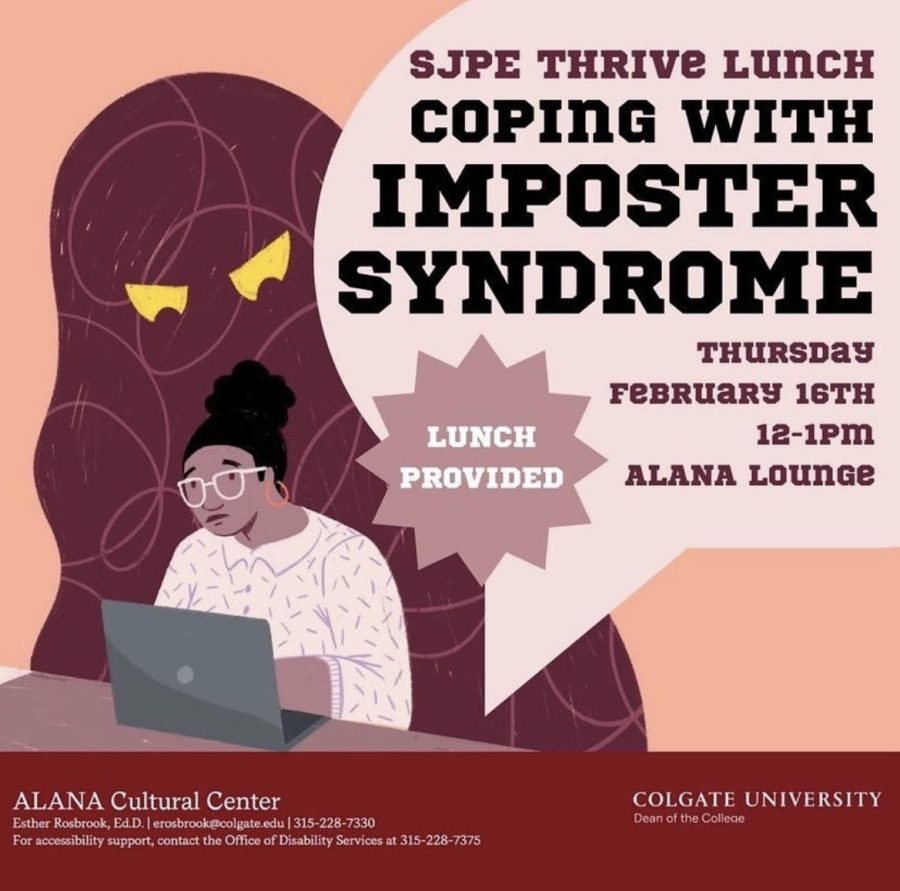ALANA ‘Thrive Lunch’ Series Discusses Imposter Syndrome
Facilitated by sophomore Anzi Wang and junior Lara Shqair, two ALANA Social Justice Peer Educators, the ALANA Cultural Center hosted a dialogue titled “Imposter Syndrome” on Feb. 16 as part of its Thrive Lunch series. Conversation surrounded how imposter syndrome impacts students and strategies for combating its effects, and the student leaders spoke about their own experiences with imposter syndrome, as well as how they felt their backgrounds and time at Colgate have affected their understanding of the topic.
Wang elaborated on the necessity of holding an open dialogue about the subject.
“Imposter syndrome is a staple event [Social Justice Peer Educators] hold at the beginning of every semester,” Wang said. “Including myself, many people I know are deeply influenced by imposter syndrome, sometimes in a way that is hard to notice. Therefore, we believe that it is a truly important topic concerning all students’ and faculties’ mental well-being, and having correct and substantial knowledge about imposter syndrome and corresponding coping mechanisms will prepare us for the upcoming challenges of the semester.”
Shqair and Wang began the talk by explaining imposter syndrome and asking audience members to provide their own examples. Many common themes appeared, including making comparisons, family pressure and grades.
“With my idea of imposter syndrome, comparison is the biggest devil for me,” Shqair said.
During the talk, Wang and Shqair emphasized the Thrive Lunch series’ focus on providing students with an action plans and gave examples of their own approaches to handling imposter syndrome.
Wang explained ways to counter the negative self-talk and unhealthy mentality imposter syndrome can bring.
“My best suggestion would be ‘acting small,’ such as getting an easy task off the to-do list or doing exercise for 10 minutes,” Wang said. “The sense of affirmation from that simple action will help construct a virtuous cycle, gradually shaping a healthier and more powerful mindset.”
According to Esther Rosbrook, director of the ALANA Cultural Center, imposter syndrome is a common focus of ALANA Thrive Lunches. It can impact anyone, and is a particularly relevant topic for university students, especially those in marginalized communities. Rosbrook noted how ALANA recognizes this, using its platform to provide a safe space for discussion and education.
“[The] event was attended by faculty, staff and students who came together to explore various characteristics of imposter syndrome and ways to tackle them,” Rosbrook said. “People shared various aspects of external and internal factors that impact people’s level of imposter syndrome. All of our social justice programs are available in our weekly outreach. We look forward to having engaging social justice conversations with everyone on campus in the near future.”
Imposter syndrome is not the only issue ALANA is targeting this semester. The Thrive Lunch series is a recurring set of conversations about many challenges faced by members of the Colgate community, and it is an important part of the ALANA Cultural Center’s mission.
“This series was started in 2018 to allow students, faculty and staff to create a safe space to explore various social justice, belonging and anti-racism topics,” Rosbook said. “This semester, trained Social Justice Peer Educators would lead [discussions on] various topics, including imposter syndrome, anti-Blackness, gatekeeping among the BIPOC community, bridging church and Queer communities, relationship building 2.0, inclusivity among Greek Life organizations and many more.”
Rosbrook concluded by restating ALANA’s mission as a center that strives for inclusivity and support for all students.
“Our comfortable and safe space at the ALANA Cultural Center is available for everyone and anyone who wants to learn more about the various social justice topics, opportunities and resources we provide,” Rosbrook said.

LJ Coady is a junior from Houston, TX concentrating in political science with minors in history and religion. She has previously served as a writer for...











